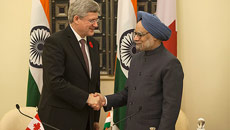An effective strategy for improving the economy or a marketing move to please the people?
The rising cost of real estate in Vancouver has been the talk of the town for years – and rightfully so. Earlier this summer saw a 37 per cent increase in the price of detached homes since last year, leaving potential homeowners or those looking to move both out of luck and potentially out of town. Buyers have been left without affordable homes to purchase, looking to anyone in a position of authority to help reign in the skyrocketing prices.
In an effort to alleviate the rising costs and make homeownership more available for residents of metro Vancouver, the provincial government announced its plan to implement a 15 per cent property transfer fee on foreign residents late in July of this year. Effective as of August 2, in what has been called a “hasty” and “bold” move by some in the industry, the tax has already managed to shake up the market in a very short period of time – whether it’s for better or worse is still up in the air.

A dip in home sales has been reported in the short few weeks following the implementation of the tax but insiders can only speculate on its long-term effectiveness at this point.
“I don’t think it will help increase the price or decrease the price,” says Mayur Arora, realtor and owner at One Flat Fee Realty. “I think it psychologically will slow down the market a bit...and I think it already has got the desired effect they were looking for.”
Puneet Agrawal, director of business development at Canadian Western Bank, offered his opinion: “There will surely be some impact due to this new tax but in what form is yet to be seen. We may see prices stabilizing for now or minor price correction in the short run.”
But his additional insight seems to be echoed by many in the industry. “The only way to stabilize the real estate market is to increase the supply because as long as the demand keeps outstripping the supply, we will keep seeing prices go up higher and higher.”
Agrawal’s comments were reiterated by Daljit Thind, CEO, Thind Properties, who believes the only thing to be controlled is the supply and demand. “This tax does not help to reduce the price,” he says. “The first time homebuyer has to afford a house for their income and that will happen if we have enough supply and we build enough houses…taxing is not a solution.”
“If [the government] can build more houses and more condos – that will help. Right now, the big issue for the government is that the building permit is so slow.”

The concept of building more residences is not new for the city or province – it’s actually recognized by the decision makers and part of the reason this new tax was introduced, as BC Minister of Finance Michael de Jong explained to DARPAN.
“The thought was to introduce a measure that would cool down somewhat the foreign involvement and the upward pressure foreign involvement was having on our domestic residential real estate market” he says. “We see this as a temporary measure to allow us to get on with the real solution, which is increasing supply. What we have done here is to try to temper demand but people love the lower mainland. We are an international province, international country; people are going to continue to come here. What this will do is provide us with an opportunity to catch up in generating more housing supplies.”
While Minister de Jong said the decision to introduce the tax has been a popular one, with the speed in which it was implemented being the only concern he’s heard, it seems there are other criticisms that many believe will negatively impact the city.
The provincial government had a chance to implement a similar tax last year but, at the time, believed that such a tax would reduce the equity of current homeowners if prices were forced down outside of the natural market demand. This hasn’t gone unnoticed by industry insiders this time around, making the move less attractive to sellers in such a hot market.

“It is unusual to enact such taxes in such a short time without proper consultation with all stakeholders and industry experts,” says Agrawal. “I think the issue which the industry has with this additional tax is the way it was brought in i.e., without proper notification and consultation. Over and above that, by making this new tax retroactive made it even worse.”
Arora expressed similar concerns and strongly stated that he doesn’t agree with the tax. “I don’t think this has been thought of or talked through. I think there were some fundamental problems with this tax. They did not grandfather in the deals that were in place,” he said. “That’s not fair for anybody or anywhere in this world.”
Stories of immigrants who have worked hard to become residents of the city, professionals like engineers who came here on work permits, only to be slapped with the tax on a deal in process of closing, have unfortunately made the news on several occasions since the tax was introduced – a punishment made possible only by unfortunate timing.
“How can they afford this 15 per cent tax? It is not fair for them,” Daljit Thind says. “[The] government has done a mistake in introducing this tax.”
Harjinder Thind, RED FM radio host and news director, pointed out that the Chinese consul-general in Vancouver has expressed her concern over the new tax, indicating that she doesn’t believe it will work and has only made buyers angry – but not unwilling to pay, even if the tax was 50 per cent.

“I don’t think it’s going to affect the foreign buyers,” says Rahul Gill, CEO, Gilco Real Estate Services, expressing his belief that he doesn’t foresee the tax having an impact on the rising prices. “If you are buying a five million dollar home, you can afford the 15 per cent tax,” he says.
“I don’t agree with this tax because I think you’re messing around with the market and I think you should let the market determine its own price,” says Arora, expressing his concern with the legalities of such government interference.
“So far, since this came into action, prices haven’t been controlled,” notes Harjinder Thind. “There are less sales, but the prices are still maintaining” and the data backs up his claims.
While the real estate market may show signs of cooling down out West, it appears to be sending some of the heat across the country to Toronto where an already hot market is heating up. In light of the tax, foreign buyers may be taking their money elsewhere, sending house hunters over to Ontario to invest.
Only time will tell if the tax is effective in the way it was meant to be. With many other factors affecting the cost of homeownership, it’s difficult to determine exactly what the right answer is or will be in the future.
“Nobody really knows if it will work or not,” says Harjinder Thind. “They’re experimenting,” he says of the government.
An experiment on the economy may be a risky and potentially unstable move but the people asked for something to be done and the government answered their call, quieting some concerns while raising others.
As the economic laws explain, prices will continue to be dictated by the imbalance between supply and demand. The tax on foreign buyers may do its part to shock the market but shaking it up certainly doesn’t bring it in to balance. Prices may or may not decrease but the true cost of the tax – for foreign buyers, local buyers, sellers and the city – will be measured in more than dollars and will only come with time.






